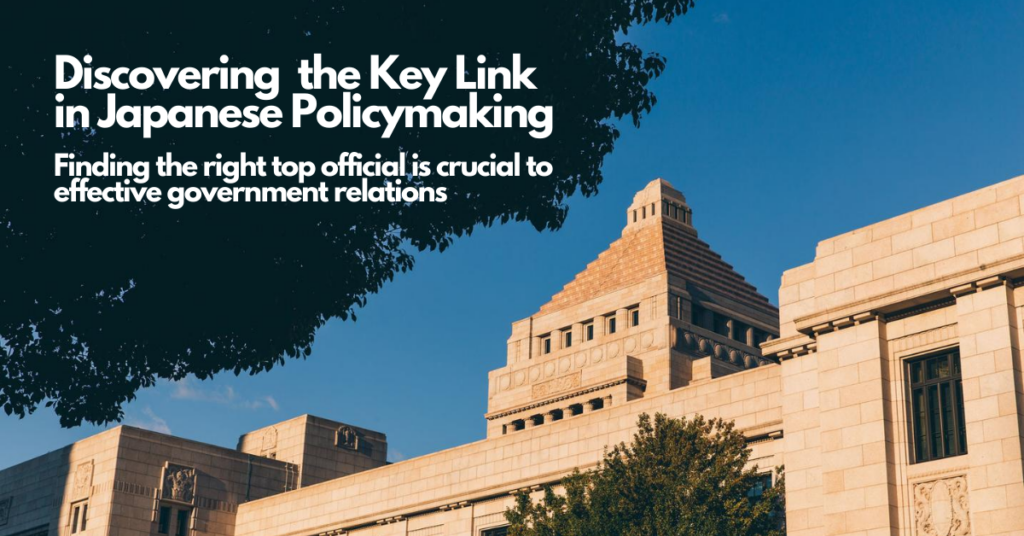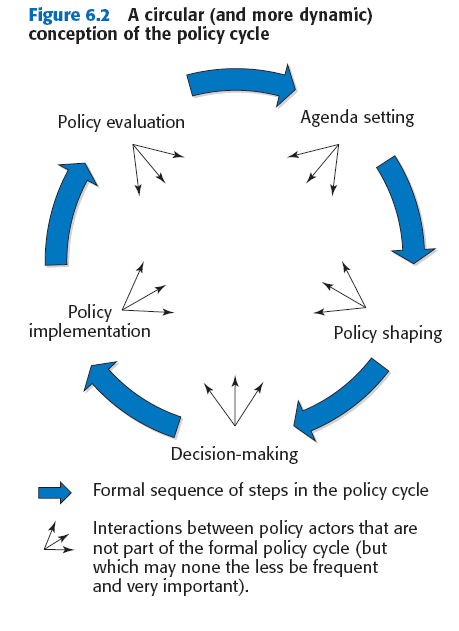
Discovering the Key Link in Japanese Policymaking
Finding the right top official is crucial to effective government relations
MATÉO VIARD, Associate
Updated on March 18, 2025
Originally posted February 14, 2019
Understanding and accessing the civil service is crucial to successful government relations in Japan. Career bureaucrats at the government agencies and ministries are among the most influential policymakers in the country.
The vast majority of Japanese legislation is brought to the Diet by the cabinet. Most of those bills are formulated within bureaucratic agencies. That means that officials in those agencies wield extensive influence in identifying policy objectives and drafting legal language, and also in enacting legislation ratified by the Diet.
Government relations professionals can engage with officials at three stages of the policy process — agenda-setting, decision-making and implementation. They must consider how to frame important issues, and where, when and how to best exercise pressure. Engagement with officials can be particularly effective in the agenda-setting and implementation stages, where bureaucrats enjoy extensive leeway.

Agenda-setting within the bureaucracy involves three steps. First, officials set a policy objective following feedback from civil society, businesses or interest groups. Interest groups play a crucial role here, as officials must be convinced of the need to address existing policy in the first place. After that, bureaucrats examine possible methods of achieving their objective and conduct intra-ministry discussions. Finally, officials coordinate with their counterparts in other ministries, politicians, affected industries, unions and interest groups to draft legislation.
In addition to this process, officials consult interest groups through the government’s many deliberative councils — government agencies are advised by about 200 such groups. These councils feature representatives from different parts of society. They also offer an opportunity for government relations specialists to make their case during the policy development process.
After government officials reach a common position and draft legal language, the bill moves to the LDP’s Policy Affairs Research Council, and the ruling party addresses the legislation internally. Finally the bill proceeds to the Diet for ratification.
Bureaucrats have nearly sole authority in administering and interpreting laws, making them hugely powerful. Nuances in ministerial directives can have a major impact in the regulatory market. This means it is important for advocacy groups to provide information and feedback to the people who are actually implementing the law.
Japan has experienced extended periods of government instability before, so contact with bureaucrats — who maintain their position of influence in the policy process for a much longer period — is very valuable. Government relations professionals must closely follow and be familiar with the many ministries.
Changes since the 2014 National Public Service Law
In 2014, Prime Minister Abe Shinzo oversaw the biggest change to Japan’s civil service since the end of World War II — the National Public Service Law. The bill was an attempt by the LDP to curb bureaucrats’ power and make them more subordinate to elected officials.
The law gives the PM power over the appointment and administration of career bureaucrats through the Bureau of Personnel Affairs. Ministers can also appoint a larger number of top positions within their respective ministries. This means they can bring more compliant officials from other ministries or draw people from the private sector.
Some critics charged that the law attempted to limit officials’ power only through the appointment system. The policy-making process is essentially bottom-up, meaning bureaucrats still have much of the power in agenda-setting and implementation.
But politicians now have a more active role in the ministries under their watch and more ability to reduce policy drift. As in most democratic systems, the final decisions on the specifics of legislation remain on the hands of actors with veto-power during the decision making process. In other words, the elected members of the Diet and the government.
Why a government affairs team is necessary
A successful advocacy strategy has to decide how to frame issues and how to approach the relevant officials. However, accessing Japan’s bureaucracy is much more complex than reaching politicians. For this reason, foreign companies are often surprised by the difficulty of the process. One meeting is simply not enough, and it may even damage a company’s ability to work with public officials or harm its credibility. A small step in the wrong direction through miscommunication, a wrong supposition or simply being too direct with policy preferences can easily tarnish a relationship forever. The last thing a company needs is an enemy within the regulatory process.
Companies must have a full understanding of Japan’s unique regulatory dynamics and policy-making process to conduct effective advocacy. With over 30 years of experience in the field, Langley Esquire can serve as your partner in public policy in Japan, and make sure that your concerns reach the right people.
If you face challenges in implementing effective government affairs, contact us to learn more about how we can support you.





